|
|
|
Sort Order |
|
|
|
Items / Page
|
|
|
|
|
|
|
| Srl | Item |
| 1 |
ID:
104833
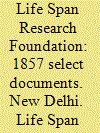

|
|
|
|
|
| Publication |
New Delhi, Life Span Publishers and Distributors, 2008.
|
| Description |
8 vol. set; p.
|
| Contents |
Vol. 1: Punjab
Vol. 2: Punjab - A
Vol. 3: Punjab - B
Vol. 4: Punjab
Vol. 5: Bengal Army
Vol. 6: Bengal Army
Vol. 7: Bengal Army
Vol. 8: Bengal Army (Proclamations, letters and dispatches)
|
| Standard Number |
9788183690003, hbk
|
|
|
|
|
|
|
|
|
|
|
|
Copies: C:8/I:0,R:8,Q:0
Circulation
| Accession# | Call# | Current Location | Status | Policy | Location |
| 056077 | 954.03/LIF 056077 | Main | On Shelf | Reference books | |
| 056078 | 954.03/LIF 056078 | Main | On Shelf | Reference books | |
| 056079 | 954.03/LIF 056079 | Main | On Shelf | Reference books | |
| 056080 | 954.03/LIF 056080 | Main | On Shelf | Reference books | |
| 056081 | 954.03/LIF 056081 | Main | On Shelf | Reference books | |
| 056082 | 954.03/LIF 056082 | Main | On Shelf | Reference books | |
| 056083 | 954.03/LIF 056083 | Main | On Shelf | Reference books | |
| 056084 | 954.03/LIF 056084 | Main | On Shelf | Reference books | |
|
|
|
|
| 2 |
ID:
099932
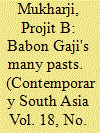

|
|
|
|
|
| Publication |
2010.
|
| Summary/Abstract |
Babon Gaji is a curious god. He is avowedly a Muslim, and the icons that represent him seek to capture his 'Muslim-ness' conspicuously in their attire, not to mention the name itself (Gaji = Ghazi = Muslim warrior-monk) and local lore. Yet he is worshipped by Brahmin Hindu priests who are equally conspicuous in flaunting their Hindu-Brahmin identity. There are no stories about the Gaji ever having been a Hindu or having had anything more than an intellectual interest in Hinduism. He remains, thus, in his afterlife a Muslim; yet, he receives worship through Brahmin priests. Both Hindus and Muslims come to him in large numbers today, in search of a cure for their afflictions. Local accounts place the origins of his shrine at Tajpur, South 24 Parganahs a little over 100 years ago, yet, no account of either the cult or the shrine - to the best of my knowledge - exists in the colonial archive. Neither are there any known written accounts outside the colonial archive that are more than a couple of decades old. For the historian of colonial medicine in the region, therefore, the Gaji presents a difficult challenge.
|
|
|
|
|
|
|
|
|
|
|
|
|
|
|
|
| 3 |
ID:
183177
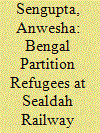

|
|
|
|
|
| Summary/Abstract |
This article focuses on the Sealdah railway station in Calcutta, West Bengal, as a site of refugee ‘settlement’ in the aftermath of British India’s partition. From 1946 to the late 1960s, the platforms of Sealdah remained crowded with Bengali Hindu refugees from East Pakistan. Some refugees stayed a few days, but many stayed for months, even years. Relying on newspaper reports, autobiographical accounts and official archives, this article elaborates how a busy railway station uniquely shaped the experiences of partition refugees. Despite severe infrastructural limitations, the railway platforms of Sealdah provided these refugee residents with certain opportunities. Many preferred to stay at Sealdah instead of moving to any government facility. However, even for the most long-term residents of Sealdah, it remained a temporary home, from where they were either shifted to government camps or themselves found accommodation in and around Calcutta. The article argues that by allowing the refugees to squat on a busy railway platform for months and years, the state recognised a unique right of these refugees, their right to wait, involving at least some agency in the process of resettling.
|
|
|
|
|
|
|
|
|
|
|
|
|
|
|
|
| 4 |
ID:
107960
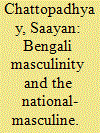

|
|
|
|
|
| Publication |
2011.
|
| Summary/Abstract |
This article examines how Bengali masculinity has been negotiated between national and ethnic/local notions of identity and suggests a new way of understanding this issue. Within the specific historiography of Bengali masculinity, concerns regarding physical strength, courage and virility of the Bengali male have been central tropes, challenged by the colonially constructed stereotype of the effeminate Bengali. The present article maps mainly nineteenth century discourses regarding Bengali masculinity and focuses on one particular strategy of three, namely, construction of a mode of mythic-historical discourse to reclaim a supposedly more masculine past for Bengali men. This suggests the notion of national-masculine as a gendered materialisation of the compensatory agency of Bengali masculinity. Shown to occur through the articulation of buddhibal in contrast with bahubal that negotiates with the hegemonic national-masculine, this throws new light on the emerging prominence of the bhadralok concept of a sophisticated Bengali gentleman.
|
|
|
|
|
|
|
|
|
|
|
|
|
|
|
|
| 5 |
ID:
142708
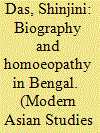

|
|
|
|
|
| Summary/Abstract |
Despite being recognized as a significant literary mode in understanding the advent of the modern self, biographies as a genre have received relatively little attention from South Asian historians. Likewise, histories of science and healing in British India have largely ignored the colonial trajectories of those sectarian, dissenting, supposedly pseudo-sciences and medical heterodoxies that have flourished in Europe since the late eighteenth century. This article addresses these gaps in the historiography to identify biographies as a principal mode through which an incipient, ‘heterodox’ Western science like homoeopathy could consolidate and sustain itself in Bengal. In recovering the cultural history of a category that the state archives render largely invisible, this article argues that biographies are more than a mere repository of individual lives, and in fact are a veritable site of power. In bringing histories of print and publishing, histories of medicine, and histories of life writing practices together, it pursues two broad themes: first, it analyses the sociocultural strategies and networks by which scientific doctrines and concepts are translated across cultural borders. It explores the relation between medical commerce, print capital, and therapeutic knowledge to illustrate that acculturation of medical science necessarily drew upon and reinforced local constellations of class, kinship, and religion. Second, it simultaneously reflects upon the expanding genre of homoeopathic biographies published since the mid-nineteenth century: on their features, relevance, and functions, examining in particular the contemporary status of biography vis-à-vis ‘history’ in writing objective pasts.
|
|
|
|
|
|
|
|
|
|
|
|
|
|
|
|
| 6 |
ID:
124954


|
|
|
|
|
| Publication |
2013.
|
| Summary/Abstract |
The contemporary Bangladeshi cinema is stained red by the enthusiastic use of fake blood that erupts from bodies pictured in fist fights, gun battles and sword attacks. In this article, I draw on my ethnographic fieldwork in the Bangladesh film industry to illustrate the spurting of fake blood in two popular film genres: mainstream action cinema and straight-to-VCD rural crime stories (kiccha pala VCDs). I suggest that the affective intensity ascribed to blood by film insiders points to the capacity of blood to lend force to the protean and submerged discourses of contemporary Bangladesh presented in these blood-splattered genres. These film forms make use of the excessive and abject quality inherent in this bodily tissue as well as interacting with more regimented and metaphoric uses of blood in the political aesthetics of contemporary Bangladesh that they recycle and pervert.
|
|
|
|
|
|
|
|
|
|
|
|
|
|
|
|
| 7 |
ID:
075667
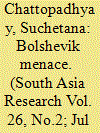

|
|
|
|
|
| Publication |
2006.
|
| Summary/Abstract |
This article examines the impact of the anti-Bolshevik surveillance network created by the colonial state on the urban political milieu of Calcutta during the late 1910s and the early 1920s. The first socialists in Calcutta (1921-24), predominantly Muslims, emerged from the ranks of urban intellectuals and political activists. The article argues that the state's insistence on labelling various social and political segments, including early socialists, as political tools of Moscow demonstrated its inability to grasp the local responses to an international current. It is shown that despite enforcement of various strategies, which tried to anticipate and prevent the spread of socialism, the colonial state failed to counter the emergence of the left in the city.
|
|
|
|
|
|
|
|
|
|
|
|
|
|
|
|
| 8 |
ID:
087351
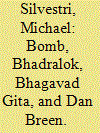

|
|
|
|
|
| Publication |
2009.
|
| Summary/Abstract |
This article will analyze several issues relating to terrorism in colonial India, focusing on the province of Bengal from the early 1900s to the mid-1930s. First, I will analyze the composition of Bengali revolutionary organizations. Although Bengali revolutionary terrorism was not a mass movement, I argue that there was greater diversity in the movement's social and religious composition, and in the outlook of its members, than is often assumed. Second, I will examine the question of indigenous versus foreign influences on Indian terrorism. Terrorism in Bengal and elsewhere in colonial India was diverse in its inspirations, drawing upon indigenous resistance to colonial rule, and Hindu religious imagery, as well as European anarchist, nationalist, and socialist movements. Lastly, I will consider some of the ways in which the revolutionary movement changed over its thirty-year history and conclude with a brief discussion of the colonial response to Bengali terrorism. Bengali terrorists' adaptation and re-fashioning of ideas and tactics in a colonial context illustrate the widespread networks of exchange within the British Empire.
|
|
|
|
|
|
|
|
|
|
|
|
|
|
|
|
| 9 |
ID:
119706


|
|
|
|
|
| Publication |
2013.
|
| Summary/Abstract |
Desiring to "engender" the written history of the Communist Party of India (CPI) and the movements it led or initiated, the author looks at the first generation of middle-class women who became communists in colonial Bengal in the period 1939 to 1948. Judging that much of the available printed and archival source material inadequately describes the role of women in the CPI, the author interviewed many of the surviving women CPI recruits and studied their printed memoirs. She examines in particular two organizations that were established in the late 1930s and early 1940s, namely, the Chhatri Sangha (Girl Students' Association) and the Mahila Atma Raksha Samity (Women's Self-Defense Association). The author contends that the recruiting and mobilizing strategies of the CPI-while focused primarily on class-also had important consequences for gender relations: many middle-class women found themselves transgressing the narrowly constructed norms of propriety and mixing with women of lower classes and working in public spaces together with men in ways the existing nationalist feminisms/nationalist conceptions of women's public activism had not made available. The author concludes that these revelations show the need to rethink stereotypes about the communist women, stereotypes built from the experiences of new generations of feminists in the 1960s and 1970s, but which seem not to have been as rigidly created or enforced in the 1940s as they were later on.
|
|
|
|
|
|
|
|
|
|
|
|
|
|
|
|
| 10 |
ID:
036659
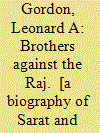

|
|
|
|
|
| Publication |
New Delhi, Viking peguin India books, 1989.
|
| Description |
viii, 807p.Hbk
|
| Contents |
Includes selected bibliography, index.
|
| Standard Number |
0670828998
|
|
|
|
|
|
|
|
|
|
|
|
Copies: C:1/I:0,R:0,Q:0
Circulation
| Accession# | Call# | Current Location | Status | Policy | Location |
| 032140 | 923.254/GOR 032140 | Main | On Shelf | General | |
|
|
|
|
| 11 |
ID:
164106


|
|
|
| 12 |
ID:
111800
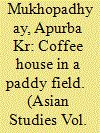

|
|
|
| 13 |
ID:
107958
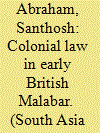

|
|
|
|
|
| Publication |
2011.
|
| Summary/Abstract |
This article examines the development of colonial law in Malabar between 1792 and 1810. Within the historical context of emerging colonialism as a pivotal factor, it shows that there was no simple unilinear process in the making of colonial law in this region of India, but rather a series of continuities and discontinuities of practices. A clear shift in the logic of governance is identified, however, as new technologies of power, particularly writing and documentation, resulted in several formalities of practices in the making of the colonial state and legal system in India.
|
|
|
|
|
|
|
|
|
|
|
|
|
|
|
|
| 14 |
ID:
079532
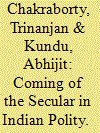

|
|
|
|
|
| Publication |
2007.
|
| Summary/Abstract |
Instead of searching for a definitive connotation of what is 'secular', the present essay explores how secular concepts gradually arrived on the scene of the Indian polity from a variety of areas and re-examines possibilities of probing the place of the secular in Indian polity by problematising its practice over time. Our methodology involves a shift of focus in searching for the roots of this concept in local and peripheral arenas rather than central texts and events. The dynamics of Indian centre-periphery relations have been dominantly historicised by the struggle for independence. This essay highlights the relevance of peripheral texts in defining secular aspects of polity, examining the dominant texts of the centre from the vantage point of the margin. While documenting an alternative discursive construction of secular politics in India, a sociologically informed reading on the question of 'the secular' argues that it will never dominate Indian politics without multiple challenges
|
|
|
|
|
|
|
|
|
|
|
|
|
|
|
|
| 15 |
ID:
180675
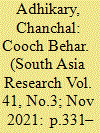

|
|
|
|
|
| Summary/Abstract |
For constructing the medieval political history of Cooch Behar, also known as Koch Bihar, the Persian manuscript of BahÂristÂn-i-Ghaybī, discovered in 1919 by Jadunath Sarkar in the Bibliothèque Nationale of Paris, is very significant. This text facilitates our understanding of important historical events in eastern India during the time of Mughal Emperor Jahangir (1601–27). The text also provides important details of peasants’ revolts during the Mughal occupation, with remarkable implications until recent times regarding border relations between India and Bangladesh. The article examines the historical facts presented in this important text and corroborates them with other sources to argue that this text should be read as a chronicle for the history of warfare, society and peasants’ life in the region throughout the seventeenth century, with significant implications for later historical developments in Cooch Behar.
|
|
|
|
|
|
|
|
|
|
|
|
|
|
|
|
| 16 |
ID:
116622
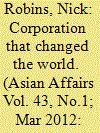

|
|
|
|
|
| Publication |
2012.
|
| Summary/Abstract |
For over 200 years the East India Company was the world's largest corporation. Set up as a merchant trading house in 1600, it became a permanent joint stock company in 1657, the forerunner of the modern multinational. The tension between investment and speculation was reflected in a share price which rose and fell with its fortunes. In the beginning bullion was brought from Britain to pay for Indian goods, which were then shipped to Britain. But in 1766, not long after Clive's victory at the battle of Plassey, the Company acquired the diwani, the right to collect the taxes, in Bengal. A situation of "unrequited trade" was thus established. Suddenly the profits from tax collecting more than covered the cost of trade goods. The dividend, jumped from six per cent in 1766 to 12 per cent in 1769. The shares soared. Then the Company's position in South India was threatened and the share price collapsed. The Company had overwhelming debts, but was judged "too big to fail". It had to be bailed out by the British government, which in return secured the right to nominate representatives to the Bengal Council. Corruption and accountability became increasingly important themes. By the time Warren Hastings was Governor-General the company was purchasing vast quantities of tea from China. What could be sold to China in return? Answer: Indian opium. This trade notoriously led to war with China. But by the end of the Second Opium War, the Indian Mutiny had put paid to the Company's rule over India, though the Company continued a financial existence until 1874.
|
|
|
|
|
|
|
|
|
|
|
|
|
|
|
|
| 17 |
ID:
100233


|
|
|
| 18 |
ID:
139944
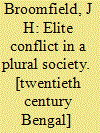

|
|
|
|
|
| Publication |
Bombay, Oxford University Press, 1968.
|
| Description |
xv, 349p.: maps, tables, abbre.hbk
|
|
|
|
|
|
|
|
|
|
|
|
Copies: C:1/I:0,R:0,Q:0
Circulation
| Accession# | Call# | Current Location | Status | Policy | Location |
| 003736 | 954.14/BRO 003736 | Main | On Shelf | General | |
|
|
|
|
| 19 |
ID:
143315
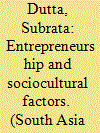

|
|
|
|
|
| Summary/Abstract |
Sociocultural factors in relation to the concept of entrepreneurship have been neglected in theories of economic development. While the growth of entrepreneurship often involves social and cultural issues, mainstream economists seem averse to discuss this. The present article emphasises the need for interdisciplinary enquiry to better understand various kinds of South Asian entrepreneurial activity and success from ethnographic and psycho-sociocultural perspectives. Existing research confirms that several non-economic factors can be identified as highly relevant for entrepreneurship and economic success. The article analyses those findings, places them in a wider context and calls for further research.
|
|
|
|
|
|
|
|
|
|
|
|
|
|
|
|
| 20 |
ID:
105029
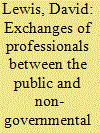

|
|
|
|
|
| Publication |
2011.
|
| Summary/Abstract |
Using recently-collected ethnographic life history data, this paper analyses in historical context the shifting boundary between governmental and non-governmental 'worlds' in Bangladesh. First, the paper explores the ways in which this boundary is an ambiguous one, and aims to show how it is constructed and maintained, through an analysis of new types of 'boundary-crossing' professionals who cross between the two sectors in the course of their career trajectories and their social relationships. Second, it suggests that such movements across this boundary throws light on changing professional identities in Bangladesh, such as what it means to work as a public servant or a development worker. High-achieving university graduates are now less likely to choose civil service careers than they once were, because new opportunities exist for them to work more flexibly as 'non-governmental professionals' in roles that may allow them to combine professional, consultant and activist identities.
|
|
|
|
|
|
|
|
|
|
|
|
|
|
|
|
|
|
|
|
|